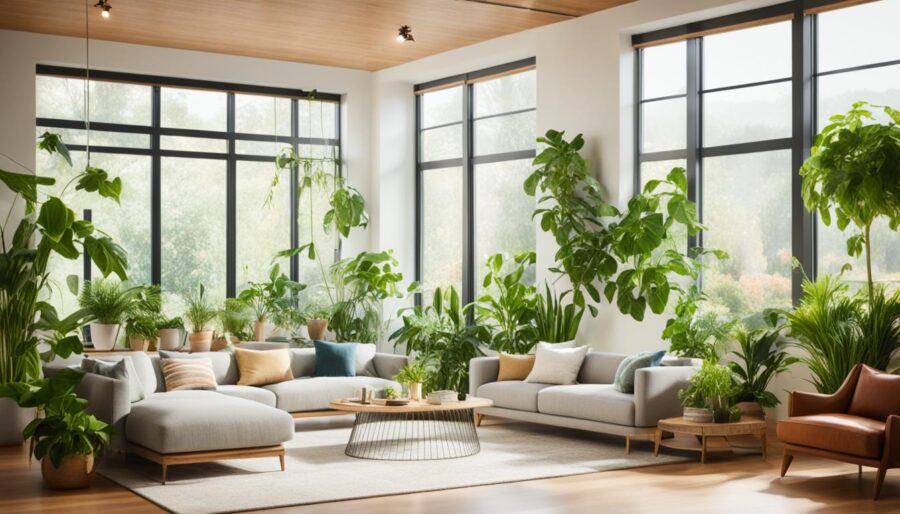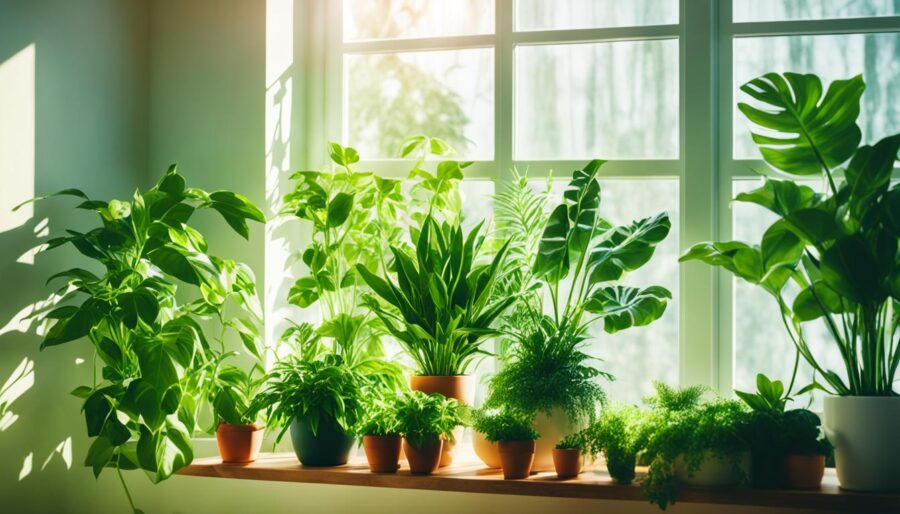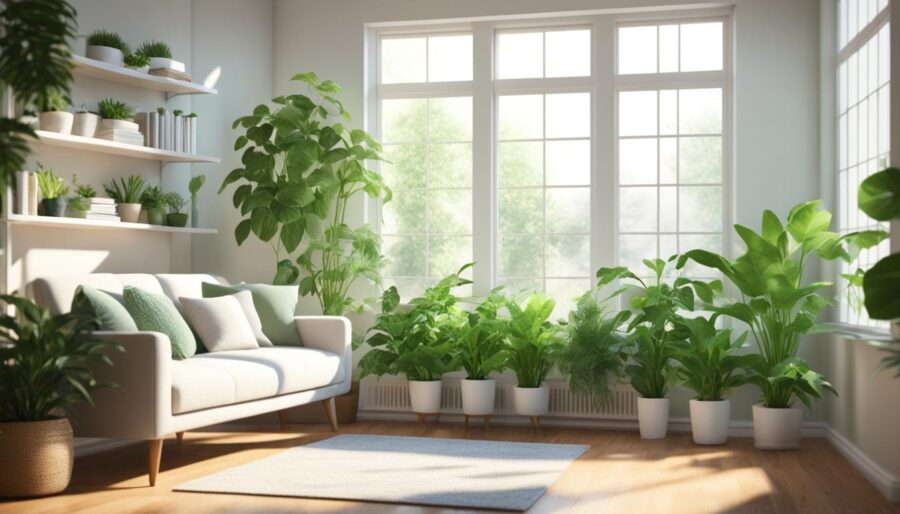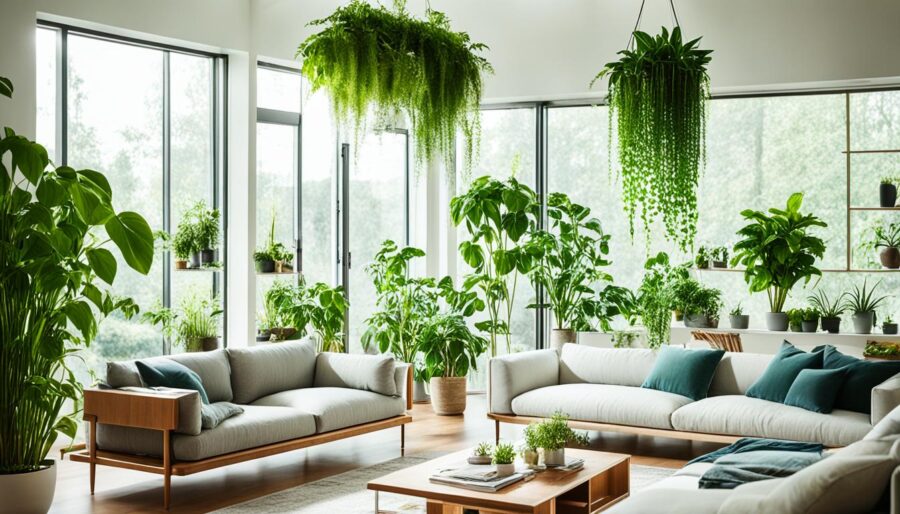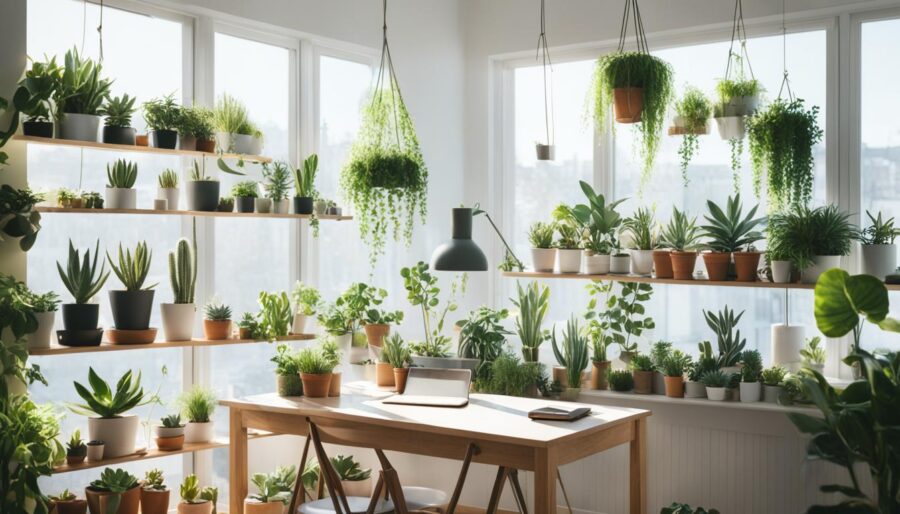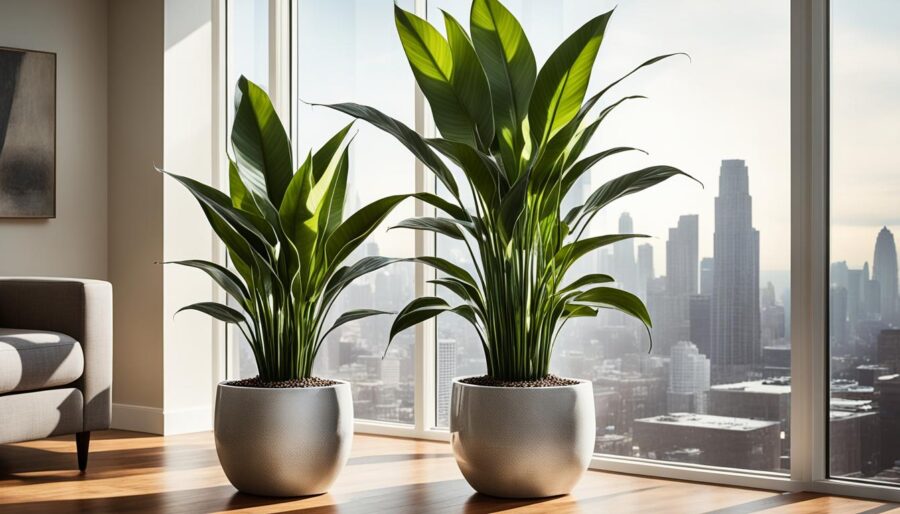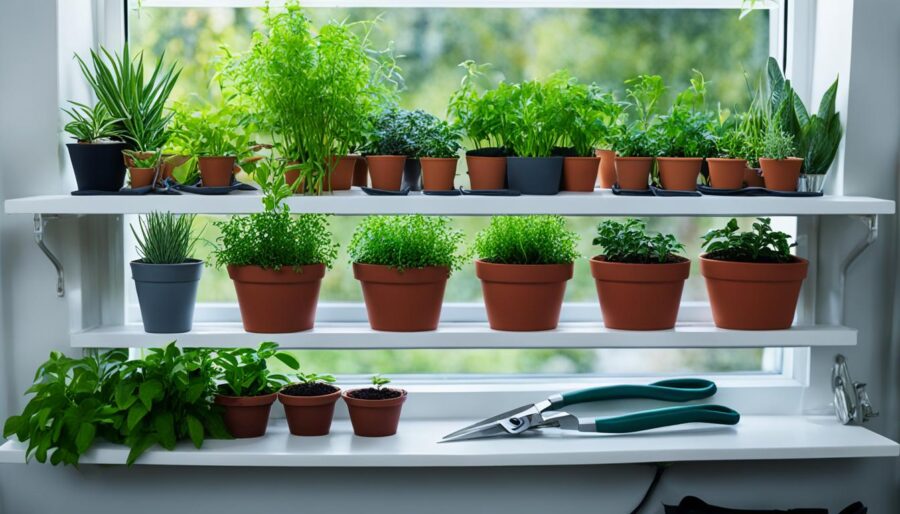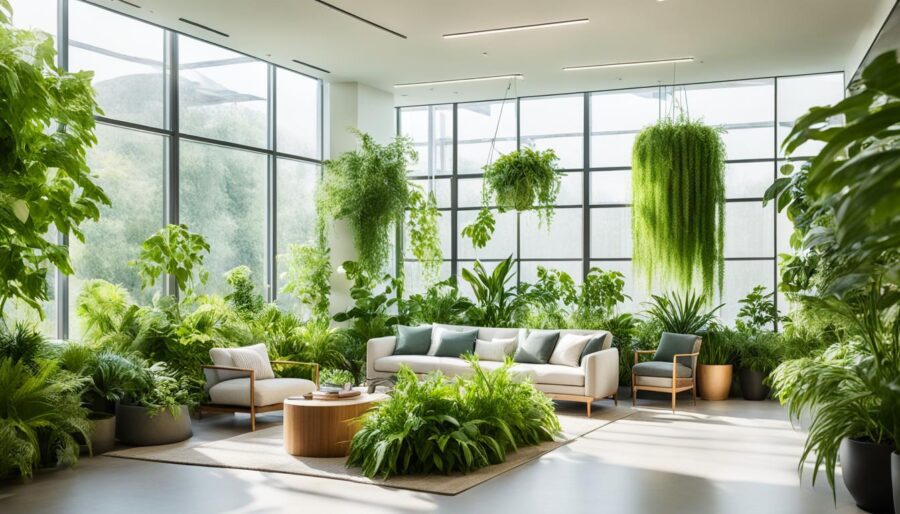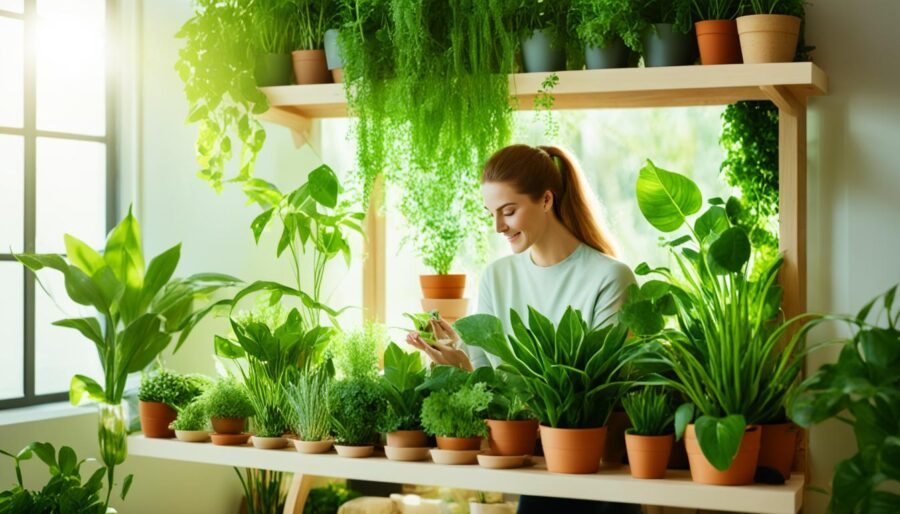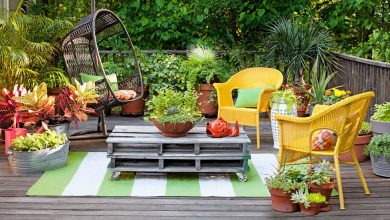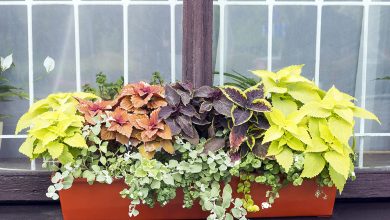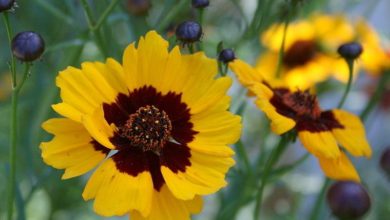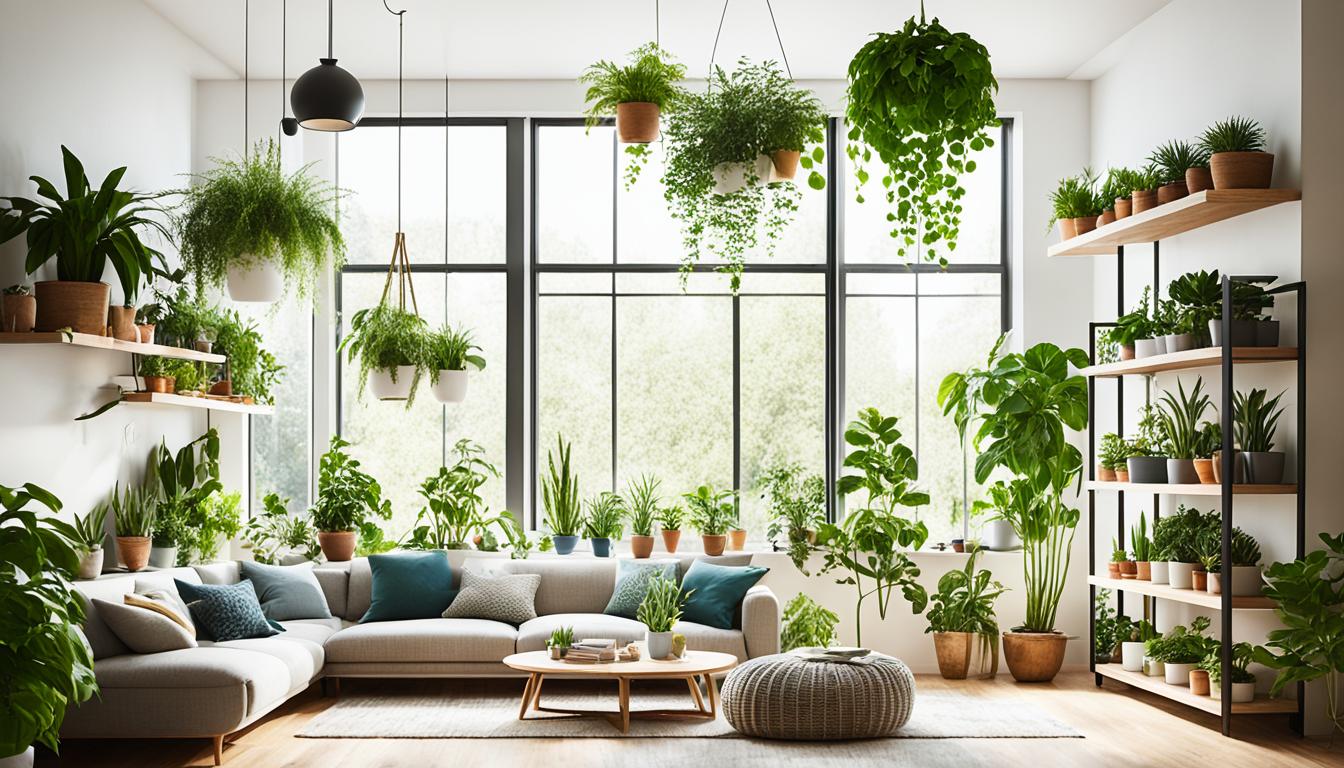
Have you ever wondered if there’s a simple and natural way to improve your overall health and wellbeing? A solution that not only enhances the aesthetic appeal of your living space but also creates a healthier and more productive environment? Look no further than indoor plants.
These green companions have gained immense popularity for a reason. They offer a myriad of benefits that go beyond just beautifying your home. From purifying the air to reducing stress and boosting productivity, indoor plants have a remarkable impact on our physical and mental wellbeing.
But how exactly do indoor plants contribute to better air quality and mental health? And what is the role of indoor plants in home decor and productivity? In this article, we will uncover the secrets behind the importance of indoor plants and their astounding benefits. So, let’s dive in and explore why incorporating indoor plants into your living spaces is a game-changer for your health and wellbeing.
The Rise of Indoor Gardening in Modern Living Spaces
Indoor gardening has experienced a significant rise in popularity in modern living spaces. This can be attributed to several factors. Firstly, nature’s influence in interior design trends has been prominent in recent years, with more people incorporating natural elements such as indoor plants into their homes.
The integration of plants into interior spaces adds a touch of greenery that brings a sense of freshness and vitality to the overall aesthetic. Not only do indoor plants enhance the visual appeal of a space, but they also create a calming and soothing atmosphere, contributing to a sense of well-being and relaxation.
Secondly, the advent of plant-based podcasts and subscription services has made it easier for individuals to learn about and acquire indoor plants. Plant enthusiasts can now access valuable information on plant care, propagation techniques, and styling tips through informative and entertaining podcasts. Additionally, subscription services offer a convenient way to purchase and receive plants directly at home. This accessibility and convenience have made indoor gardening more accessible and appealing to a wider audience, regardless of their previous experience or knowledge.
Indoor gardening has gained traction due to the numerous benefits it offers. One of the key advantages is the potential for air purification. Indoor plants have the ability to remove harmful pollutants and toxins from the air, improving indoor air quality and creating a healthier living environment.
Additionally, the presence of indoor plants has been linked to stress relief and enhanced well-being. Studies have shown that being in the presence of plants can reduce stress levels, boost mood, and promote a sense of serenity. Moreover, indoor plants can serve as beautiful and versatile home decorations, adding a touch of green and vibrancy to any space.
For those seeking a clean and fresh indoor atmosphere, certain plants are known for their air-purifying properties. These plants absorb toxins and release oxygen, helping to create a healthier living environment. Some popular choices for air purification include the Peace Lily, Spider Plant, and Snake Plant. These plants not only contribute to cleaner air but also require minimal maintenance, making them suitable for beginners and busy individuals.
Indoor plants offer a range of benefits, including improved air quality, stress relief, and enhanced home decor. By incorporating indoor plants into modern living spaces, individuals can create a more inviting, calming, and health-promoting environment.
| Advantages of Indoor Gardening | Indoor Plants for Home Decoration | Indoor Plants Benefits | Indoor Plants Air Purification |
|---|---|---|---|
| Improved air quality | Enhances the visual appeal of any space | Stress relief and enhanced well-being | Removes harmful pollutants from the air |
| Creates a calming and soothing atmosphere | Brings a touch of greenery and vibrancy | Contributes to a sense of serenity | Creates a healthier living environment |
| Promotes a sense of well-being and relaxation | Adds a natural and organic element to decor | Reduces stress levels and boosts mood | Minimal maintenance requirements |
Understanding the Health Benefits of Houseplants
Houseplants offer a wide range of health benefits that contribute to our overall wellbeing. These benefits include improved air quality, reduced stress levels, enhanced mental wellbeing, and improved aesthetics in the home. Indoor plants have been found to filter harmful pollutants from the air, creating a healthier indoor environment. They also have a calming and therapeutic effect, reducing stress and anxiety.
Additionally, the presence of indoor plants in the home can improve mood, increase productivity, and enhance overall mental wellbeing. Taking care of houseplants can also provide a sense of purpose and fulfillment. In this section, we will delve deeper into these health benefits and provide tips on how to care for indoor plants.
Importance of Indoor Plants
Indoor plants play a crucial role in promoting a healthy and balanced environment. They not only enhance the aesthetics of our living spaces but also provide numerous health benefits.
In this section, we will explore how indoor plants contribute to stress relief, well-being, and productivity. We will also provide valuable tips on caring for indoor plants to ensure their optimal health and longevity.
Stress Relief through Horticulture
Research has shown that the presence of indoor plants can have a calming effect, reducing stress levels and promoting relaxation.
The natural beauty of plants creates a soothing environment that helps to alleviate anxiety and tension. Taking care of indoor plants can be a therapeutic activity that allows you to reconnect with nature and find tranquility in the midst of a busy lifestyle.
Enhancing Focus with Green Companions
Indoor plants are not just visually appealing; they also have the power to enhance focus and concentration. Studies have demonstrated that the presence of plants in work and study spaces can improve cognitive function and boost productivity.
Having green companions in our immediate surroundings helps to create a sense of calm and improve our ability to stay focused and engaged in our tasks.
The Therapeutic Effects of Plant Care
Caring for indoor plants goes beyond their physical well-being; it also nurtures our own well-being. Engaging in plant care activities, such as watering, pruning, and repotting, can have therapeutic effects on our mental and emotional health.
Plant care provides a sense of purpose, fulfillment, and joy. It allows us to nurture and witness the growth and vitality of nature right in our own homes.
In the next section, we will delve into the importance of indoor plants in improving air quality and creating a healthy environment.
The Role of Indoor Plants in Air Quality Enhancement
Indoor plants play a significant role in enhancing indoor air quality. They act as natural air purifiers, removing harmful pollutants and toxins from the air. Studies have shown that certain indoor plants have the ability to absorb and break down volatile organic compounds (VOCs) present in indoor environments. This contributes to a healthier and cleaner indoor atmosphere.
Indoor plants are known for their air purifying properties, making them a valuable addition to any indoor space. They actively filter out pollutants such as formaldehyde, benzene, and trichloroethylene, which are commonly found in household products and materials. By having these air purifying houseplants in your home or office, you can enjoy improved air quality and reduce the risk of respiratory issues.
Not only do indoor plants enhance air quality, but they also provide numerous health benefits. By creating a cleaner and healthier indoor environment, indoor plants contribute to better respiratory health, reduced allergies, and improved overall wellbeing. Research has shown that the presence of indoor plants can even boost productivity, mood, and concentration.
To maximize the air purifying benefits of indoor plants, it’s important to choose the right plants for your space. Some of the best air purifying plants include the snake plant, peace lily, spider plant, and Boston fern. These plants have been proven to effectively filter out toxins and improve indoor air quality.
To maintain their air purifying properties, indoor plants require proper care and attention. This includes providing adequate light, water, and regular cleaning of the leaves. By following simple guidelines for indoor plant care, you can ensure that your air purifying houseplants thrive and continue to enhance the air quality in your space.
In conclusion, indoor plants play a vital role in improving air quality and creating a healthier indoor environment. With their natural air purifying properties and numerous health benefits, they are a valuable addition to any home or office. By choosing the right indoor plants and providing proper care, you can enjoy cleaner air, better respiratory health, and an overall improved sense of wellbeing.
Creating a Productive and Creative Environment with Plants
Indoor plants have the power to transform both work and home environments, creating spaces that are not only visually appealing but also conducive to productivity and creativity. In the workplace, plants go beyond being mere decorative elements – they have been found to have a significant impact on employee well-being and job satisfaction.
Plants in the Workspace: More than Just Decoration
Introducing indoor plants into the workspace can lead to a range of benefits. Studies have shown that being around plants can improve concentration, enhance focus, and increase productivity. The presence of greenery in the office has a calming effect, reducing stress and creating a more relaxed working environment. Moreover, vibrant and healthy plants can enhance the overall aesthetic appeal of the workspace, providing a pleasant and visually stimulating atmosphere.
Plants in the office can also contribute to improved air quality by acting as natural air purifiers. They absorb carbon dioxide and release oxygen, helping to create a healthier and more energizing workspace.
By incorporating indoor plants into the workplace, employers can foster a positive and engaging environment that promotes employee well-being and job satisfaction. This, in turn, can lead to increased employee morale, creativity, and overall productivity.
Bolstering Creativity and Job Satisfaction
It is not just in the workplace that indoor plants have a positive impact on our well-being. Incorporating plants into our home environment can also create a sense of calm and enhance creativity. By bringing the outdoors inside, indoor plants provide a refreshing and rejuvenating ambiance that inspires both relaxation and imagination.
The presence of indoor plants in the home has been linked to improved mental health and overall well-being. The act of caring for and nurturing plants can be therapeutic, reducing stress levels and promoting a sense of purpose. Additionally, plants in the home can contribute to improved air quality, creating a healthier living space for you and your family.
Whether in the workplace or at home, the presence of indoor plants can have a profound impact on our productivity, creativity, and overall well-being. By incorporating plants into our indoor environments, we can create spaces that are not only visually appealing but also foster a sense of calm, inspiration, and job satisfaction.
Choosing Safe and Effective Plants for Indoor Spaces
When it comes to selecting indoor plants for your home, safety and effectiveness are key considerations. It is important to choose plant varieties that are non-toxic, especially if you have children or pets in your household. Ensuring the health and safety of everyone in your home is paramount, and selecting non-toxic plants is an essential step towards creating a safe environment.
Additionally, selecting indoor plants that are known for their air purifying properties can greatly contribute to improving the indoor air quality of your space. These plants have the ability to filter out harmful pollutants and toxins, making your indoor environment cleaner and healthier for you and your loved ones.
Identifying Non-Toxic Varieties for Homes with Children and Pets
When choosing plants for homes with children and pets, it is crucial to select varieties that are non-toxic. This ensures that even if curious little hands or paws come into contact with the plants, they won’t pose a risk to their health. Some popular non-toxic indoor plants include:
- Spider Plant (Chlorophytum comosum)
- Areca Palm (Dypsis lutescens)
- Boston Fern (Nephrolepis exaltata)
- Rubber Tree (Ficus elastica)
- Parlor Palm (Chamaedorea elegans)
These plant varieties not only add beauty to your indoor spaces but also provide a safe environment for children and pets to explore.
Most Suitable Plants for Indoor Air Purification
Indoor air pollution is a growing concern, and selecting indoor plants with air purifying properties can significantly help improve the air quality in your home. Some plants are especially effective in filtering out common indoor pollutants such as formaldehyde, benzene, and trichloroethylene. Consider incorporating the following indoor plants known for their air purifying capabilities:
- Snake Plant (Sansevieria trifasciata)
- Peace Lily (Spathiphyllum spp.)
- English Ivy (Hedera helix)
- Bamboo Palm (Chamaedorea seifrizii)
- Aloe Vera (Aloe vera)
These plants not only serve as beautiful decorations but also actively work to cleanse and purify the air in your home, creating a healthier living environment.
When caring for your indoor plants, it is important to provide them with proper lighting and watering. Each plant species has specific requirements, so be sure to research and understand the lighting needs and watering guidelines for your chosen plants. This ensures that they thrive and remain healthy for years to come.
Non-Toxic Indoor Plants
| Plant | Scientific Name |
|---|---|
| Spider Plant | Chlorophytum comosum |
| Areca Palm | Dypsis lutescens |
| Boston Fern | Nephrolepis exaltata |
| Rubber Tree | Ficus elastica |
| Parlor Palm | Chamaedorea elegans |
Indoor Plants for Air Purification
| Plant | Scientific Name |
|---|---|
| Snake Plant | Sansevieria trifasciata |
| Peace Lily | Spathiphyllum spp. |
| English Ivy | Hedera helix |
| Bamboo Palm | Chamaedorea seifrizii |
| Aloe Vera | Aloe vera |
Maintaining Your Indoor Garden: Health and Safety Considerations
Ensuring the health and safety of your indoor garden is crucial for optimal plant growth and your own wellbeing. In this section, we will provide valuable tips on caring for your indoor plants and address important health and safety considerations.
Preventing and Managing Pest Infestations
Pests can be a common problem in indoor gardens and can wreak havoc on your plants if left unchecked. It is important to take preventive measures to avoid pest infestations and to effectively manage any issues that arise. Here are some tips to help you prevent and manage pest infestations:
- Regularly inspect your plants for any signs of pests, such as chewed leaves or webs.
- Isolate new plants before introducing them to your indoor garden to prevent the spread of pests.
- Keep your indoor garden clean and free of debris, as this can attract pests.
- If you notice pests, identify them accurately and choose the appropriate treatment method, such as insecticidal soaps or organic pest control products.
- Regularly prune your plants to remove any infested or diseased parts.
Plant Selection and Allergy Awareness
When choosing plants for your indoor garden, it is important to consider their compatibility with your space and any potential allergies you or your family members may have. Here are some tips for selecting plants and being allergy-aware:
- Research the specific care requirements of each plant to ensure they are suitable for your indoor environment.
- Consider the lighting conditions and temperature in your space when selecting plants.
- If you or your family members have allergies, choose plants that are less likely to trigger allergic reactions, such as non-flowering varieties.
- Keep track of any plant-related allergies and seek medical advice if necessary.
By following these tips, you can maintain a healthy and safe indoor garden that brings beauty and wellbeing to your living space.
The Psychological Impact of Biophilic Design
Biophilic design incorporates natural elements, such as indoor plants, into interior spaces, creating a harmonious and calming environment. This design approach has a profound psychological impact, promoting mental health and wellbeing. The presence of indoor plants and other natural elements in interior spaces has been found to reduce stress, enhance mood, and improve cognitive function.
Indoor plants play a crucial role in biophilic design, offering numerous benefits for mental restoration and wellbeing. The soothing presence of plants creates a connection with nature, bringing a sense of tranquility and peace to indoor spaces.
Studies have shown that exposure to indoor plants can reduce stress levels, lower blood pressure, and improve overall psychological well-being.
“The incorporation of indoor plants in biophilic design enhances the overall environment, creating a space that promotes relaxation, creativity, and productivity.” – Dr. Samantha Green, Ph.D.
Indoor plants have a positive impact on our mental health by improving concentration and focus. Research has shown that the presence of greenery in the workplace can enhance cognitive function, increasing productivity and creativity. Indoor plants also have a calming effect, helping to reduce anxiety and boost mood, creating a serene and peaceful atmosphere.
The psychological benefits of biophilic design extend beyond stress reduction and improved cognitive function. Indoor plants have been found to increase happiness, promote a sense of well-being, and create a connection with nature, even in urban environments. The indoor garden serves as a sanctuary, offering an oasis of calm amidst the hustle and bustle of daily life.
By incorporating indoor plants into interior spaces, we can create a nurturing environment that fosters mental restoration and wellbeing. The presence of nature indoors provides a sense of grounding, balance, and harmony, allowing us to reconnect with the natural world. Biophilic design and the integration of indoor plants are essential for creating spaces that support our psychological well-being and overall quality of life.
Indoor Plants as a Natural Solution for Recovery and Wellbeing
Indoor plants have long been recognized for their positive impact on our physical and mental health. Studies have shown that having indoor plants in our living spaces can aid in the recovery process from illness and surgery, while also promoting overall wellbeing.
Fostering Recovery from Illness and Surgery
Exposure to indoor plants has been found to have a therapeutic effect on individuals recovering from illness and surgery. The presence of greenery and natural elements indoors creates a soothing and healing environment, helping to reduce stress and facilitate faster recovery.
Research has shown that patients with indoor plants in their hospital rooms experience lower levels of anxiety, reduced pain perception, and improved overall wellbeing. Studies have even suggested that the presence of indoor plants can help speed up recovery time and reduce the need for pain medication.
Indoor plants provide a connection to nature, which has been shown to have restorative effects on our health. They promote a sense of calm and tranquility, allowing individuals to heal both physically and mentally.
Whether it’s a small potted plant on a bedside table or a larger plant in the corner of a room, the presence of indoor plants can make a significant difference in the recovery process, providing a natural source of comfort and support.
Green Spaces and Mental Restoration
In addition to fostering recovery from illness and surgery, indoor plants also play a vital role in promoting mental restoration. The presence of green spaces, whether indoors or outdoors, has been proven to have a positive impact on our mental health and wellbeing.
Indoor plants create a connection with nature, which has been shown to reduce stress, improve mood, and enhance cognitive function. The sight of greenery and the touch of leaves can bring a sense of peace and tranquility, helping to restore our mental energy and improve overall wellness.
By incorporating indoor plants into our living spaces, we can create a nurturing environment that supports both physical and mental health. The presence of green spaces indoors provides a sanctuary for relaxation, self-care, and emotional rejuvenation.
| Benefits of Indoor Plants for Recovery and Wellbeing |
|---|
| Promote healing and faster recovery |
| Reduce stress and anxiety |
| Provide a sense of comfort and support |
| Enhance overall wellbeing |
| Restore mental energy and improve mood |
| Create a nurturing and healing environment |
Conclusion
Indoor plants are not just decorative items; they play a pivotal role in improving our health and wellbeing. The benefits of indoor plants are extensive, ranging from their ability to purify the air we breathe to their capacity to reduce stress and enhance our mental health. By incorporating indoor plants into our living spaces, we can create a healthier and more nurturing environment.
Whether it’s in our workplaces or our homes, indoor plants have a positive impact on our productivity, creativity, and overall wellbeing. They bring the beauty of nature indoors and offer a natural solution for improving our health and wellbeing. The importance of indoor plants cannot be overstated, as they not only enhance the aesthetic appeal of our spaces but also contribute to a cleaner and healthier indoor atmosphere.
For those seeking a natural way to enhance their homes and workplaces, indoor plants are the perfect addition. They provide numerous benefits, from improving air quality and reducing stress to fostering creativity and mental restoration. By caring for indoor plants, we establish a connection with nature and create a more harmonious and fulfilling environment. So why wait? Start bringing the benefits of indoor plants into your life today!
FAQ
Q: What are the benefits of indoor plants?
A: Indoor plants have numerous benefits, including improving air quality, reducing stress levels, enhancing mental wellbeing, and improving the aesthetic appeal of your home.
Q: How do indoor plants improve air quality?
A: Indoor plants act as natural air purifiers, filtering harmful pollutants and toxins from the air. They can absorb and break down volatile organic compounds (VOCs) present in indoor environments, creating a healthier and cleaner indoor atmosphere.
Q: Can indoor plants reduce stress?
A: Yes, indoor plants can have a calming and therapeutic effect, reducing stress and anxiety. The presence of plants in the home or workspace can promote relaxation and improve overall mental wellbeing.
Q: What are some indoor plants that are safe for homes with children and pets?
A: Some non-toxic indoor plant varieties that are safe for homes with children and pets include spider plants, Boston ferns, and areca palms. These plants can provide all the benefits of indoor plants while ensuring the health and safety of your loved ones.
Q: How can indoor plants enhance productivity?
A: Indoor plants can improve productivity by reducing stress levels, enhancing focus and concentration, and creating a calming and inspiring environment. The presence of plants in the workspace has been found to increase job satisfaction and creativity.
Q: What are some tips for caring for indoor plants?
A: To care for indoor plants, make sure to provide adequate lighting and water according to the plant’s requirements. Avoid overwatering or underwatering and regularly check for pests or diseases. Each plant has specific care needs, so it’s important to research and understand the care requirements of your specific plants.
Q: How do indoor plants contribute to overall wellbeing?
A: Indoor plants contribute to overall wellbeing by improving air quality, reducing stress, enhancing mood and mental wellbeing, and providing a sense of purpose and fulfillment through plant care. The presence of plants in indoor spaces has a positive impact on our health and happiness.
Q: Can indoor plants aid in recovery and healing?
A: Yes, studies have shown that exposure to plants can help facilitate healing and recovery from illness and surgery. The presence of green spaces, whether indoors or outdoors, promotes mental restoration and provides a sense of calm and tranquility.
Q: How do indoor plants contribute to biophilic design?
A: Indoor plants are a key element of biophilic design, which aims to incorporate natural elements into interior spaces. The presence of indoor plants promotes mental health and wellbeing by reducing stress, enhancing mood, and improving cognitive function.

